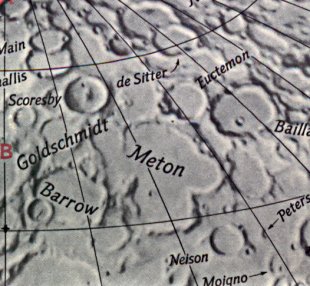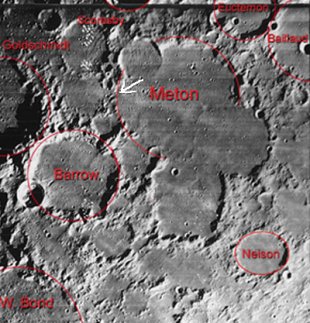

Observer: Tony Donnangelo Date/time of observation: 2003/02/09 00:21 U.T. Site location: Hummelstown RD 3, PA, USA (40.26° N., 76.75° W.) Site elevation: 479 feet (146 meters) Site classification: Suburban Moons age: 7d 13:31, 46% illuminated Instrument: Takahashi FS-102 Magnification: 158x, 234x, 315x Object: Meton (walled plain) Size: 122x122Km. Lunar ray coordinates: 11.0° E., 74.0° N. Rukl chart #: 4
While observing the Barrow Lunar Ray, thirty eight minutes before its predicted occurrence, I noticed another ray directly north of it. It was caused by a break in the western wall of Meton; located just north of crater Barrow C. The ray was a narrow shaft of light approximately the same width as the Barrow ray and ~60Km. long. It extended west of Meton onto an undesignated flat area between Barrow and crater M to the north.
In approximately a half hour, the ray broadened very quickly and became indistinguishable as a ray. Within an hour, this flat area was almost totally illuminated. It may be possible to observe this ray earlier on.
Interestingly, Larry Smith informed me that he previously observed a lunar sunset ray, from the same break in the crater wall. The ray extended east into Meton. I believe sunset and sunrise rays caused by the same formation are a rare occurrence.
Although Tomy shows the coordinates for the ray at 11.0°, 74.0° N., Meton is actually located at +19.2°, E., and 73.80° N. The inital predictions, and full page of predictions are generated using his coordinates for the ray.
Site Longitude = +76.750 Site Latitude = +40.260 Feature = Feature Longitude: = +11.000 Feature Latitude: = +74.000 Reproducing Lighting For: 2003/2/9 at 00:21 U.T. Desired Solar Altitude = +0.889(Rising), Azimuth = +98.574 Average Co-longitude = 352.227
Description of Meton (from Virtual Moon Atlas): Wrecked formation with clover shape composed of Meton, Meton C and Meton D. Little steep slopes. Little high walls. Flat floor of 3 immense craters and communicating. Clear bands. Hills and craterlets.

